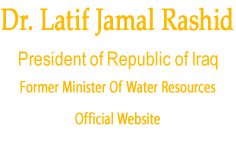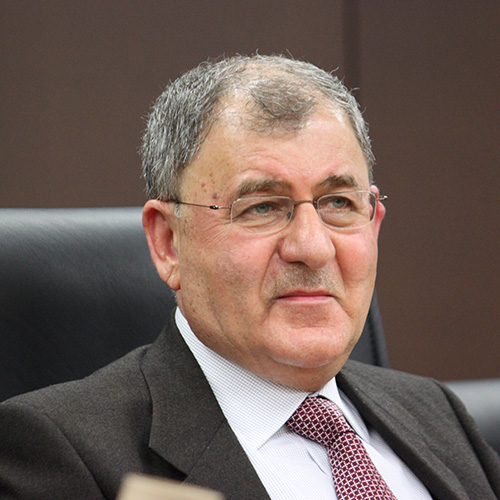Monday, July 14, 2008
An Iraqi Cabinet Minister Comes Calling
Theo Caldwell
Brendan Smialowski, AFP, Getty Images
Dr. Latif Rashid, Iraq's Minister of Water Resources, brought his vital portfolio to Canada last week in search of knowledge and partnership. He avers that Canadian equipment, technical skill and diplomacy, deployed correctly, can benefit his country and ours, as a resurgent Iraq welcomes foreign investment. Thus far, Dr. Rashid is encouraged and grateful for Canada's support.
At the best of times, Dr. Rashid's task would be a difficult one. He notes that the Middle East holds roughly 1% of the world's fresh water, which must be stretched to supply more than a billion people. His job was made tougher by Iraq's former regime, which, as a tactical and punitive measure, drained the country's 25,000 square kilometres of marshlands. This was done, Dr. Rashid points out, to provide staging ground for Iraq's war with Iran and to displace dissidents among Iraq's so-called Marsh Arabs.
While living in London, Dr. Rashid campaigned vigorously against the draining of the marshes, but to no avail. The result was an environmental and human catastrophe, during which half a million people were displaced or died.
Environmental zealots in North America burn with rage at gas-guzzling automobiles, yearning to drag soccer moms and dads from their SUVs and bludgeon them with Birkenstocks. But their anger would be better spent on men like the late Saddam Hussein -- arguably the worst environmental terrorist of all time -- whose burning of oil fields and draining of Iraq's marshes destroyed millennia-old ecosystems and did more damage to the planet than all the world's suburban carpools combined.
Since he took up his post in September, 2003, Dr. Rashid and his ministry have worked tirelessly to reverse the damage caused by the former regime. Their achievements have been extraordinary. Over 80% of the marshland has been reinstated and half the population has come back. Those Marsh Arabs who have not returned, according to Dr. Rashid, have chosen to remain in places where they established new lives in the years since their displacement.
As a senior member of Prime Minister Nouri al-Maliki's Iraqi government, Dr. Rashid speaks with authority on other issues affecting the region, from the waning insurgency to Iranian sabre-rattling.
He is encouraged that Iraqis can now travel about the country -- including to his office to make requests in person -- in a way that was impossible even a year ago. "The security situation has improved," he told me in an interview. "The relationships among various segments of society are much better. There is more understanding. A year ago, we were worried about civil war. Now, in large areas that had sectarian conflict, life has become normal again."
Dr. Rashid does not want to give a glossy picture and says that officials are still very careful. But he believes the rapid progress in his country is a function of the U. S.-led troop surge strategy, combined with Iraqis' sincere desire for peace.
Asked about the escalation of tensions between Israel and Iran in recent days, Dr. Rashid is circumspect: "The Iranians are clever. They will not allow it to get to that stage where action takes place. It might happen, but I doubt it."
Dr. Rashid is well aware of Iran's influence within his own country: "Iran has become a major power player in the region. In Iraq, Iran has got good, strong contacts with every political group."
Like many observers, Dr. Rashid draws a distinction between Iran's hard-line regime and its population. Most Iranians are under 35 years of age and they long less for war than for freedom. "Every time I go to Iran, I see the change," Dr. Rashid says with optimism. "Young people -- the way they dress, the way they talk, the way they behave."
As to the single most important step Canada could take to strengthen its partnership with Iraq, Dr. Rashid is straightforward: "Establish your embassy in Baghdad." At the moment, Canada's diplomatic mission is stationed in Amman, Jordan, where Margaret Huber, of whom Dr. Rashid speaks very highly, serves as Canadian ambassador to Jordan and Iraq. While he understands that security is a concern for foreign service workers, Dr. Rashid points out that Canada is the only G8 country that has not established an embassy in Iraq's capital.
Canada has been blessed with one of the world's largest supplies of fresh water, and has developed the technology and tools to irrigate effectively. Iraq, meanwhile, holds potential for investors as its conditions improve by the day. Dr. Rashid's mission is to bring those interests together, for the benefit of both countries.
theojpcaldwell@yahoo.com - Theo Caldwell, president of Caldwell Asset Management, Inc., is an investment advisor in the United States and Canada.


